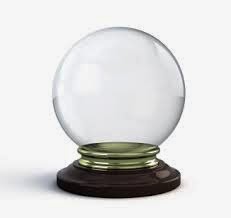 In over 20 years of Sales Management, I am still puzzled by the inability for Salespeople or Sales Management to determine an effective method of Sales Forecasting.
In over 20 years of Sales Management, I am still puzzled by the inability for Salespeople or Sales Management to determine an effective method of Sales Forecasting.Sure, the default methodology is using a combination of actual sales pipeline data (opportunities associated with confidence/probability) and something referred to as "run rate," (a psychic prediction of deals that are really not in the pipeline, but likely to appear before the end forecast period). Don't you find it unusual that these methods still permeate the very core of sales forecasting?
Lately, I've seen an influx of sophisticated tools that are advertised to make the forecasting task easier by using macros, predictions and big data. I've investigated these tools only to find that they are simply more sophisticated methods of the same process described above. With the huge investments organizations are making in CRM software (i.e. Salesforce.com, Microsoft Dynamics, Oracle, etc.), one might question why sales forecasting is still a manual process for even the largest organizations. While not "naming names," I know of a $6B organization that holds weekly forecast calls with their sales managers (who use manual spreadsheets and "psychic abilities" to predict sales), even though they have heavily invested in these massive CRM solutions.
The answer to the problem is relatively simple: salespeople alone are the key to accurate forecasting.
While Sales Management can supersede the probability of a deal closing, all of us know an well known axiom of selling: the actual salesperson has the best, first-hand knowledge of whether or not a deal is going to close in a particular period of time. The missing ingredient is one that has perplexed Sales Managers for decades. Here's the ULTIMATE PROBLEM: "Do I ask my salespeople to give up valuable sales time by documenting accurate sales forecasting information in a CRM, or do I want them out in front of customers?" The answer is always the same: We want both!
Unfortunately, you can't have both. Typically, the top 10% of salespeople are poor at administrative responsibilities. These are the folks we need the information from the most. It's a Catch-22, and it's plagued the industry from the dawn of time.
While there's no great solution for the problem, we'll continue on trying to use probability calculations, stages in the sales cycle, and other factors to predict the future. Everyone understands the unspoken truth: If your sales team has a great month, it's very unlikely that Sr. Management will deliver much grief on how well you forecasted. Let's face it. Sales teams and salespeople who kick ass and deliver results are rarely "called on the carpet" for their failure to predict upcoming sales.
Here's my solution: We all do the best we can. We try to update our forecasting tools with best-practices and hope for the best. Run rates are a powerful tool, and unt
il every salesperson in the world invests heavily on updating the latest information everyday, we will all be subject to the roller-coaster world of sales forecasting!
No happy ending here. Sorry.
Happy Selling!
Thanks
ReplyDeleteSales management is crucial to make sure sales people are working properly for selling purpose. Sales persons are worthless if sales management is not good enough. Therefore here provided key to accurate forecasting and sales management highly important in term of business success. A lot of us are tight on budget. You might want to look at panxpan's sales pipeline module which is free and lets you manage your sales prospects.
ReplyDelete